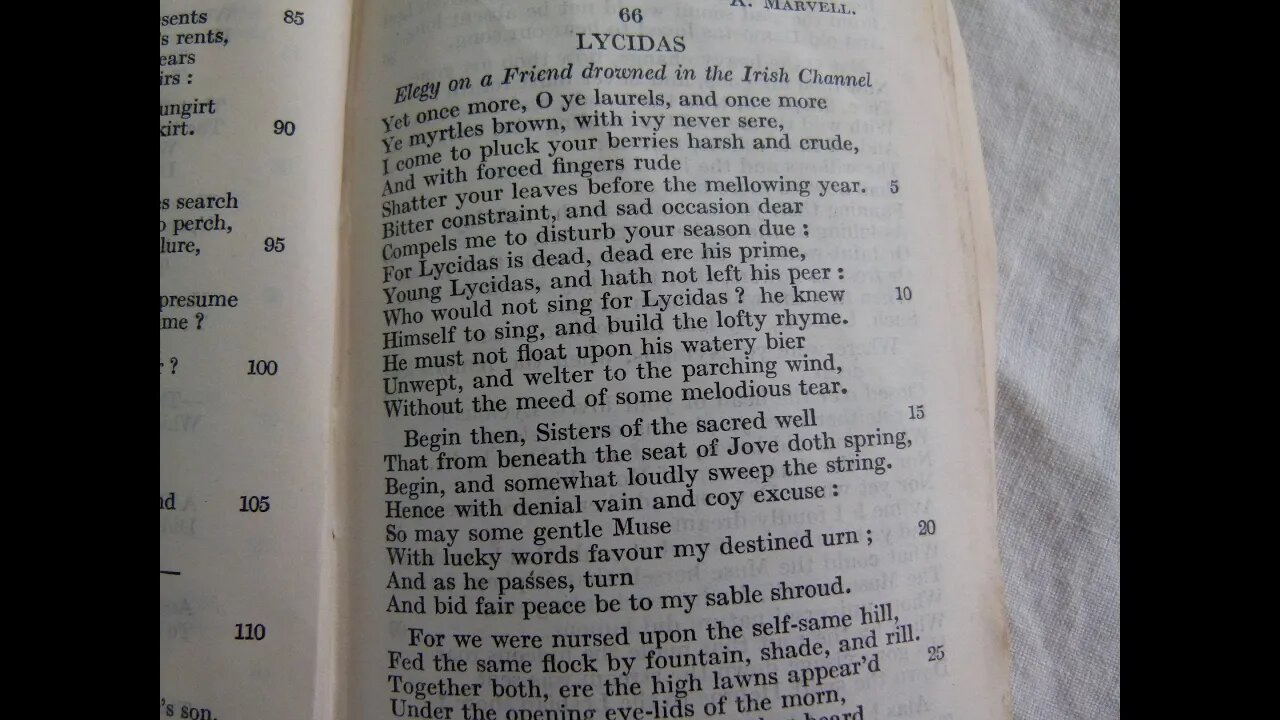Premium Only Content

Lycidas - J. Milton
66 Lycidas - J. Milton
Elegy on a Friend drowned in the Irish Channel
The sixty-sixth poem in the collection. (* additional details below - after my un-schooled interpretation.)
*NOTES FROM THE BACK OF THE BOOK:
Lycidas. The person lamented is Milton's college friend Edward King, drowned in 1637 whilst crossing from Chester to Ireland.
Strict Pastoral Poetry was first written or perfected by the Dorian Greeks settled in Sicily: but the conventional use of it, exhibited more magnificently in Lycidas than in any other pastoral, is apparently of Roman origin. Milton, employing the noble freedom of a great artist, has here united ancient mythology, with what may be called the modern mythology of Camus and Saint Peter,—to direct Christian images.—The metrical structure of this glorious poem is partly derived from Italian models.
Sisters of the sacred well: the Muses, said to frequent the fountain Helicon on Mount Parnassus.
Mona: Anglesea, called by the Welsh Inis Dowil or the Dark Island, from its dense forests.
Deva: the Dee: a river which probably derived its magical character from Celtic traditions: it was long the boundary of Briton and Saxon.—These places are introduced, as being near the scene of the shipwreck.
Orpheus was torn to pieces by Thracian women; Amaryllis and Neaera names used here for the love idols of poets: as Damoetas previously for a shepherd.
the blind Fury: Atropos, fabled to cut the thread of life.
Arethuse and Mincius: Sicilian and Italian waters here alluded to as synonymous with the pastoral poetry of Theocritus and Virgil.
oat: pipe, used here like Collins' oaten stop, No. 146, for Song.
Hippotades: Aeolus, god of the Winds. Panope a Nereid. The names of local deities in the Hellenic mythology express generally some feature in the natural landscape, which the Greeks studied and analysed with their usual unequalled insight and feeling. Panope represents the boundlessness of the ocean-horizon when seen from a height, as compared with a limited horizon of the land in hilly countries such as Greece or Asia Minor.
Camus: the Cam; put for King's University.
The sanguine flower: the Hyacinth of the ancients; probably our Iris.
The pilot: Saint Peter, figuratively introduced as the head of the Church on earth, to foretell 'the ruin of our corrupted clergy, then in their heighth' under Laud's primacy.
the wolf: Popery.
Alpheus: a stream in Southern Greece, supposed to flow underseas to meet the Arethuse.
Swart star: the Dogstar, called swarthy because its heliacal rising in ancient times occurred soon after mid-summer.
moist vows: either tearful prayers, or prayers for one at sea.
Bellerus: a giant, apparently created here by Milton to personify Bellerium, the ancient title of the Land's End.
The great Vision:—The story was that the Archangel Michael had appeared on the rock by Marazion in Mount's Bay which bears his name. Milton calls on him to turn his eyes from the south homeward, and to pity Lycidas, if his body has drifted into the troubled waters of the Land's End. Finisterre being the land due south of Marazion, two places in that district (then by our trade with Corunna probably less unfamiliar to English ears), are named,—Namancos now Mujio in Galicia, Bayona north of the Minho, or, perhaps a fortified rock (one of the Cies Islands) not unlike St. Michael's Mount, at the entrance of Vigo Bay.
ore: rays of golden light. Doric lay: Sicilian, pastoral.
Poem 70.
The assault: was an attack on London expected in 1642, when the troops of Charles I. reached Brentford. "Written on his door" was in the original title of this sonnet. Milton was then living in Aldersgate Street.
Emathian Conqueror: When Thebes was destroyed (B.C. 335) and the citizens massacred by thousands, Alexander ordered the house of Pindar to be spared. He was as incapable of appreciating the Poet as Lewis XIV. of appreciating Racine: but even the narrow and barbarian mind of Alexander could understand the advantage of a showy act of homage to Poetry.
the repeated air \Of sad Electra's poet: Amongst Plutarch's vague stories, he says that when the Spartan confederacy in 404 B.C. took Athens, a proposal to demolish it was rejected through the effect produced on the commanders by hearing part of a chorus from the Electra of Euripides sung at a feast. There is however no apparent congruity between the lines quoted (167, 8 Ed. Dindorf) and the result ascribed to them.
-
 16:40
16:40
Actual Justice Warrior
14 hours agoSydney Sweeney REFUSES To Apologize For Being White
19.5K38 -
 1:57:23
1:57:23
MG Show
19 hours agoTrump Makes Announcement; Erika Kirk 1st Interview
27.7K24 -
 8:01
8:01
MattMorseTV
13 hours ago $0.34 earnedTrump just GUTTED the ENTIRE SYSTEM.
75.9K85 -
 20:02
20:02
Nikko Ortiz
13 hours agoBlades And Sorcery Is The Ultimate Medieval Fantasy
18.4K6 -
 2:12:18
2:12:18
Side Scrollers Podcast
21 hours agoSide Scrollers VTuber TAKE OVER with Kirsche, Rev Says Desu & DarlingStrawb | Side Scrollers
100K17 -
 29:15
29:15
BlabberingCollector
1 day agoHarry Potter X Fortnite, Fans Reee Over Trans Rights, NEW Audiobooks Are OUT, Wizarding Quick Hits
14.6K1 -
 1:20:42
1:20:42
The Connect: With Johnny Mitchell
5 days ago $0.33 earnedThe Truth Behind The U.S. Invasion Of Venezuela: Ed Calderon Exposes American Regime Change Secrets
17.9K7 -
 LIVE
LIVE
Lofi Girl
3 years agolofi hip hop radio 📚 - beats to relax/study to
199 watching -
 21:39
21:39
TruthStream with Joe and Scott
2 days agoJoe, Scott and Lewis, Censorship and the Nov 8th event in Carlsbad California!
16.2K2 -
 22:47
22:47
The Pascal Show
1 day ago $0.28 earnedTHEY’RE HIDING EVIDENCE?! Candace Owens EXPOSES Foreign Connection In Charlie Kirk Shooting
40.9K44